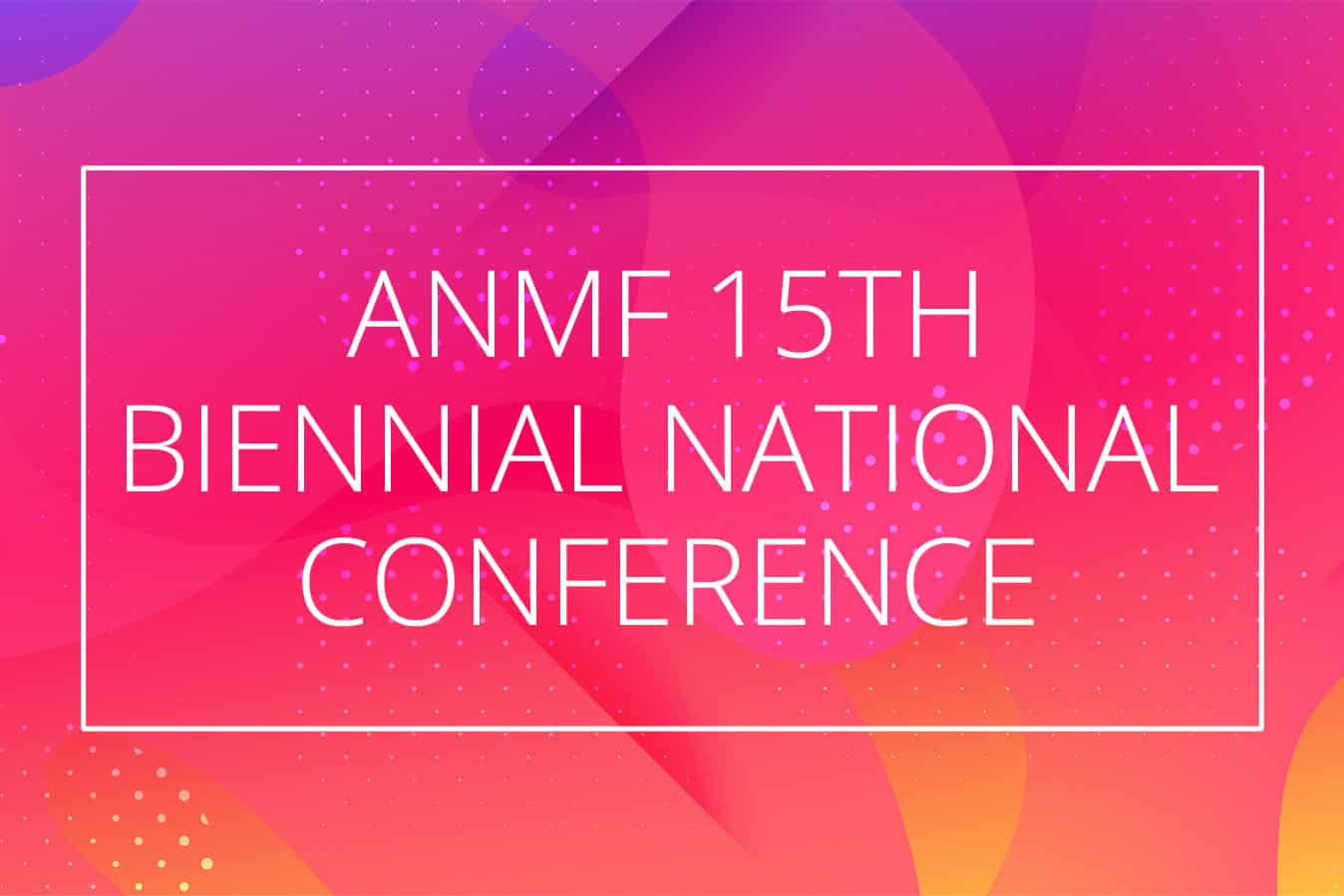Nurse, midwife and care worker delegates from across the country gathered virtually for the first time to set the Australian Nursing and Midwifery Federation’s (ANMF) agenda for the next two years at the 15th Biennial National Conference last Friday.
The conference theme, Powerful & Proud: Nurses, midwives and care workers standing strong, touched on the workforce’s ongoing sacrifice and resilience in the face of the ongoing COVID-19 pandemic.
Opening the conference, and addressing delegates from the UK, former Prime Minister and current Beyond Blue Chair Julia Gillard praised the knowledge and efforts of healthcare professionals responding to the pandemic, including getting vaccines into arms to help the world emerge from the pandemic.
“Your work is the way you show your commitment to others and your community and this has always been so. However, I acknowledge the last year and a half has been difficult and confronting. I thank you all for what you have done and the work you continue to do,” Ms Gillard said.
“I want to especially acknowledge those of you in Victoria and NSW presently on the frontline caring for great numbers of people, some of whom are gravely ill. The professions you have chosen, to provide medical aid, to care for and to help others, are vital to our community and you are crucial to managing us through the pandemic.”
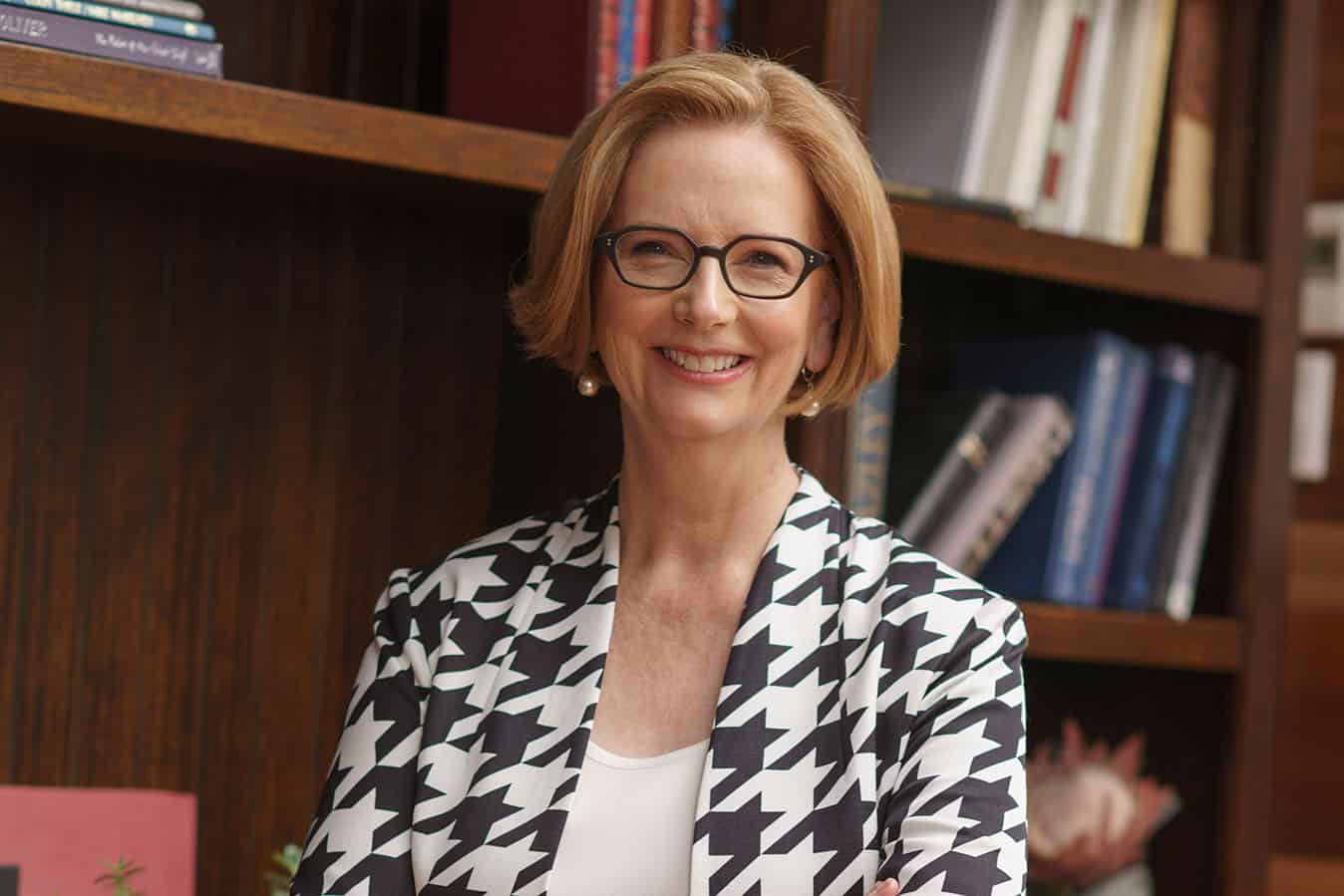
Reflecting on 2020, the International Year of the Nurse and Midwife, ANMF Federal President Sally-Anne Jones said what was meant to be a year of celebration, instead turned into one of the greatest challenges for nurses, midwives and care workers amid the pandemic.
“It became the year through which nurses, midwives and care workers demonstrated more publicly than any ceremony, campaign or march the value that we hold in our hands,” she told delegates.
Ms Jones later led delegates in a minute’s silence to honour the thousands of nurses globally who have died from COVID-19 in the line of duty, also highlighted the Australian nurses, midwives and care workers currently battling COVID-19 across hospitals, nursing homes and communities.
“Covid is not a disease of the weak, ill or poor. It can affect anyone at any time with devastating outcomes,” she said.
“When I think of the expert, focused nursing that these patients are receiving I feel humbled, honoured and respectful of the work. Sometimes it saves a life. Most often, it offers comfort, care and dignity. It’s quite extraordinary.”
The work of nurses, midwives and care workers had been thrust into the spotlight by the pandemic and created new opportunities for expansions to full scope in some areas, Ms Jones said. Yet, the resulting pressure on the health system and the workforce has been immeasurable.
“As nurses, midwives and care workers heading into potentially many years of politically and financially turbulent times as our country and the world recovers from this pandemic, we must remain powerful and proud, and be courageous, use our voice and continue to take action to make sure the health system and the equity is visible, to highlight the shared stake we have in our health, and the future.”
In her report, ANMF Federal Secretary Annie Butler took delegates through the past two years of extraordinary challenges faced by nurses, midwives and care workers. From summer bushfires to the pandemic, the greatest health emergency the world has seen in more than a hundred years.
“ANMF members across the country worked tirelessly and with all levels of governments, stakeholders and communities to defeat the outbreak. Nurses, midwives and carers put up their hands to ask how they could help. Thousands completed additional training and retired nurses signed up to return to the workforce. Because of these actions, the first wave of Covid in Australia was quickly controlled,” she recalled.
As the nation confronts the current Delta variant, Ms Butler said nurses, midwives and care workers are at the heart of the response.
“Our strength has been our health system. An adaptable, universally accessible health system staffed by highly skilled clinicians. And our weakness the plague of insecure work and entrenched inequality which has assured that Covid has disproportionately affected the vulnerable and disadvantaged and shown us that our systems favour some Australians over others.”
Viewed from a global perspective, Ms Butler said the health system’s management of Covid and the nation’s comparatively low death rate could be called a success. However, the greatest failing remains the federal governments sluggish vaccination rollout, especially its bungled handling of the rollout in aged care.
“It is no exaggeration to say that had the Prime Minister taken his responsibility to secure vaccine supply and protect Australians more seriously we may have had a chance to get on top of this Delta outbreak more quickly. The consequences of this failure are wide-reaching, economically, and socially, with prolonged lockdowns and border closures keeping families apart, aged care residents alone, and many vulnerable people out of work.”
Ms Butler said seeking government action to address widespread health system pressures has underlined much of the ANMF’s work over the past two years.
In particular, the federal government fell short in its response to the Aged Care Royal Commission’s recommendations for improved staffing and transparency and accountability.
The ANMF will continue to ramp up its lobbying in aged care and across numerous other areas, such as the super gap and economic security for women, and urgent measures to address significant stress across the health system.
“But we don’t just need an increase to funding, we need changes to funding models,” Ms Butler added.
“We’re calling for funding models which recognise the contribution of nurses and midwives and nurse-led and midwife-led models of care and the impact they can have in delivering better care and better health to the community. All work that needs to continue.”
During the conference, delegates put forward and debated a range of issues facing the professions. All resolutions are yet to be officially endorsed by the ANMF’s Federal Executive.
Resolutions included:
- prioritising and addressing the current excessive demands on the public health system across the country, including nurses and midwives being able to work to full scope;
- actively campaigning for and supporting planned expenditure that is given preferred targeting towards key health targets in the Sustainable Development Goals of the World Health Organization in preference to that which may contribute to global military expenditure, including that spent on nuclear weapons;
- that the ANMF reaffirm its support for comprehensive community services, including community health, social housing and homeless accommodation;
- that the ANMF call on the state and federal government to address the current and projected shortages of nurses and midwives in Australia and overseas;
- providing every frontline nurse/midwife with their own personal duress pendant to help address occupational violence and aggression;
- championing and promoting the universal implementation of and access to continuity of midwifery care models for all women; and
- that the ANMF engage in discussions with relevant stakeholders so that all graduate nurses, midwives and enrolled nurses have access to a federally funded Transition to Practice Program (TPP) in their graduate year
Importantly, two resolutions focused on the health and rights of asylum seekers and refugees. The first called on the ANMF to lobby the federal government to free all detainees into the community that have been processed by the federal government and deemed of good character to enter Australia under refugee status.
The second called on the ANMF to actively campaign for comprehensive healthcare ranging from primary to tertiary care for all refugees who seek safety and refuge in Australia.
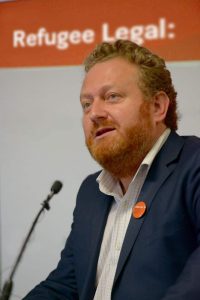
In his keynote address to delegates, human rights lawyer David Manne, the Executive Director and Principal Solicitor at Refugee Legal, the largest provider of free legal assistance to disadvantaged migrants, asylum seekers and refugees in Australia, described healthcare professionals as a big part of the solution in combatting injustice.
He said he had experienced no more powerful collaboration than with health professionals in challenging and creating change, freedom and a fair go for refugees.
“One of the most fundamental developments in recent years in combatting the cruelty and injustice inflicted on people seeking asylum in this country has not just been through the intervention of lawyers or judges or the media or human rights activists or advocates, but through the intervention of health professionals, through the advocacy and action by nurses, by midwives, by care workers, by doctors,” Mr Manne said.
“It’s been a critical intervention in this country, acting on a clear-cut duty to care which transcends the toxic politics of the day and to speak up which elevates this to target the core issue at stake really which is the health and protection of people from harm.”
Delegates also positioned aged care as a central focus moving forward over the next two years. A resolution acknowledged the ANMF’s members’ work in giving evidence to the Royal Commission. To secure meaningful action, delegates said the ANMF must continue to expand its national campaign to implement mandated safe staffing ratios and skills mix in aged care, improve wages and conditions for the workforce, enhance workforce capacity, and improve accountability and transparency for taxpayer provided funding.
Several politicians sent messages of support to nurses, midwives and care workers attending the National Biennial Conference, highlighting their amazing efforts over the past two years in the face of the pandemic. They included Labor Leader Anthony Albanese, Labor MP Claire O’Neil, former ANMF Federal Secretary and current Shadow Assistant Minister for Aged Care Ged Kearney, Independent MP Andrew Wilkie, and Greens Leader Adam Bandt. Tellingly, Prime Minister Scott Morrison did not provide a message of support.
Speaking to delegates later on in the conference, Shadow Minister for Health and Ageing Mark Butler pledged the party’s support for long overdue aged care reform.
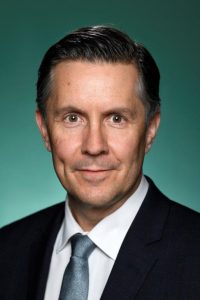
“It has still shocked me the extent of the crisis in aged care right now,” he said.
Mr Butler said the Labor Party was committed to improving wages across the sector, improving transparency and accountability, and mandating staff ratios.
“The first thing that we are committed to addressing of those gaps is the question of wages. They have always been and they will continue to be central to making sure we have the supply of workers that we need today, and more importantly, over coming decades,” he said.
“The second thing I want to do is improve that accountability. There were recommendations in the RC that the government simply did not take up in that area.
“But the most important reform a federal government could make to aged care is to put in place staffing mandates. Putting the nurses back into nursing homes first of all and its inexplicable to me that the government did not accept the Royal Commission’s recommendation to mandate a registered nurse in every facility every hour of the day, every day of the year
“We are also committed as a Labor party to mandatory staff ratios, and a proper mix of qualifications among that staff group.”
Mr Butler said the policy commitment had not yet been finalised but that the Party was committed to working with the ANMF moving forward.
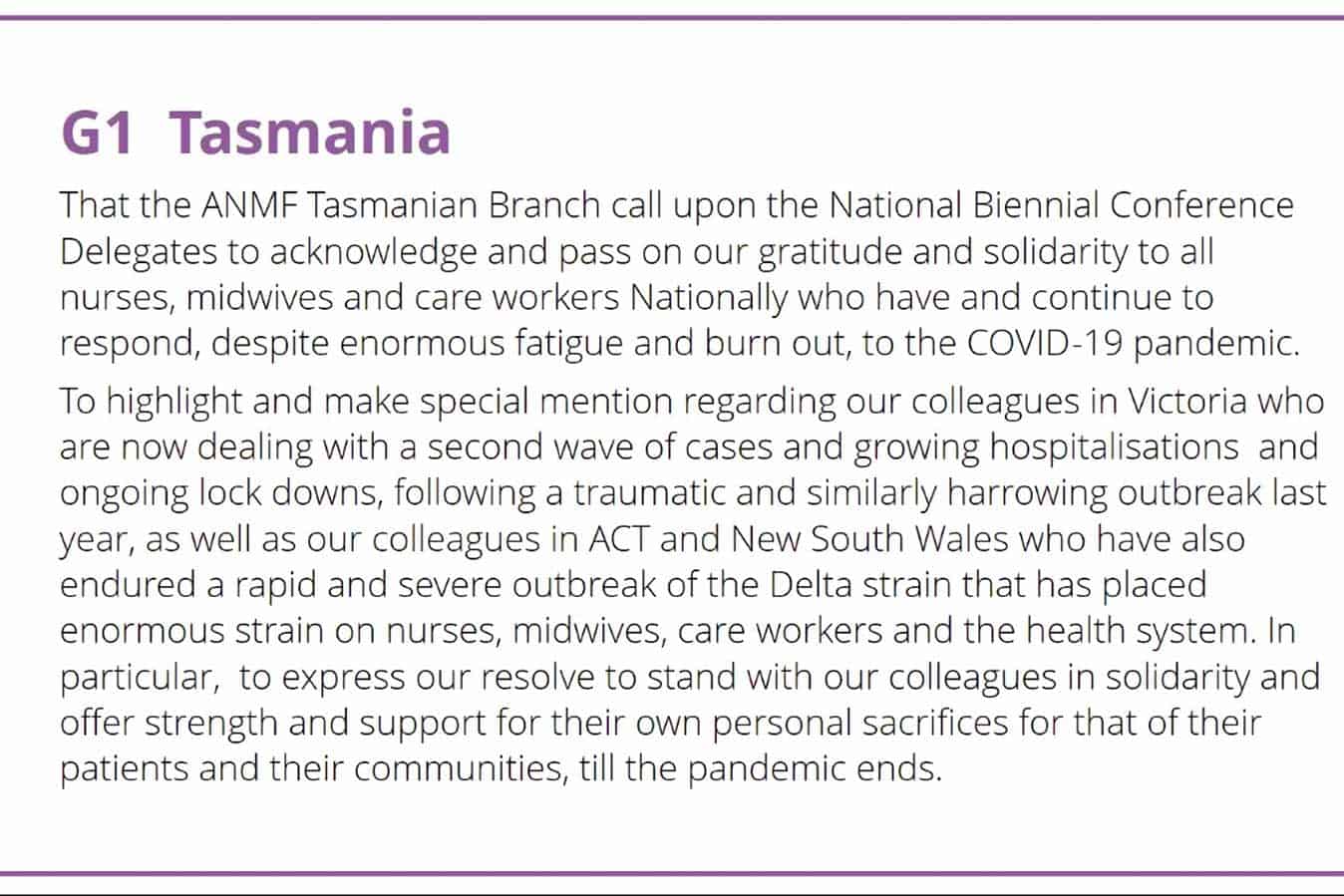
Meanwhile, the ANMF (Tasmanian Branch) presented a special resolution calling upon conference delegates to “acknowledge and pass on our gratitude and solidarity to all nurses, midwives and care workers nationally who have and continue to respond, despite enormous fatigue and burnout, to the COVID-19 pandemic.”
The 15th National Biennial Conference concluded with the announcement that Sydney, which was meant to host this year’s event, would instead host the forthcoming 2023 conference.
Federal President Sally-Anne Jones called on delegates to reflect on the conference theme, powerful and proud, and the hard work that lies ahead over the next two years.
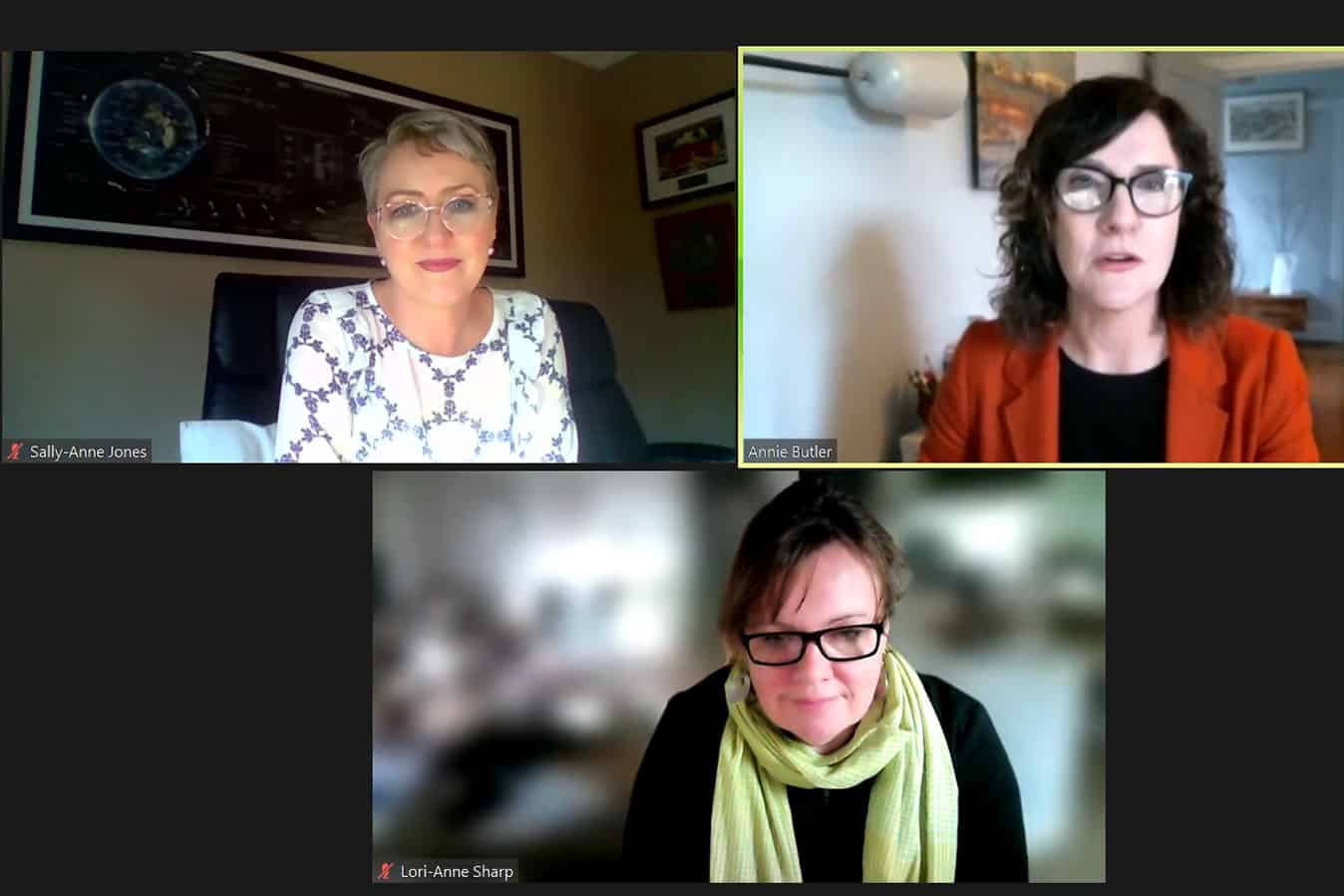
“Although we’ve talked about Covid, because it fills up so much of what we’re doing right now, besides Covid, there are other failures in the healthcare system, there are challenges in aged care, there’s a lack of transparency and funding in community care, the primary sector needs work, mental health is severely underfunded and needs new energy and vision and the acute care sector is experiencing unprecedented activity,” Ms Jones said.
“And whether that’s as a direct or indirect outcome of Covid, the system is still broken, no matter which way you look at it.
“Our leadership and collective might is incredibly important, not just to us and the professions, but to the entire community.”


